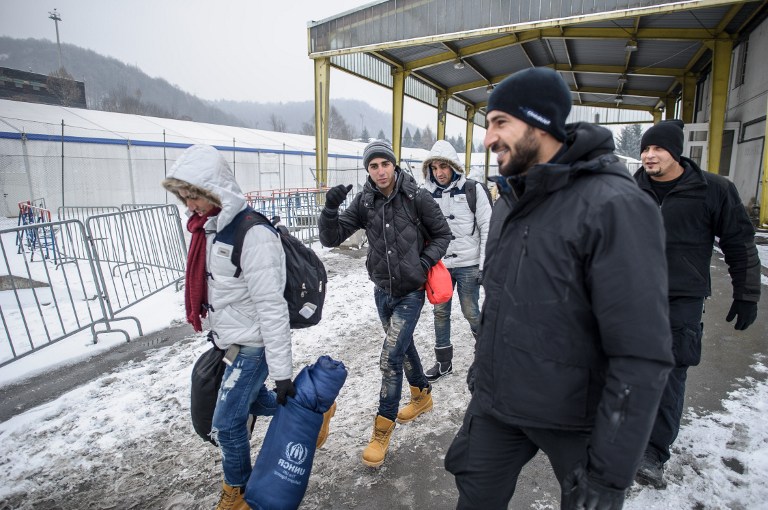Snow makes migrants' journey through Europe even harder
 |
| Refugees and migrants walk to cross the Slovenian-Austrian border on January 5, 2016 in Sentilj. (Photo: Rene Gomolj/AFP) |
SENTILJ, Slovenia: It is the first time that Arman Butt, a Pakistani man desperately seeking to reach western Europe, sees snow. But as the 30-year-old goes limp in the harsh chill, stuck at the Slovenian-Austrian border, he wishes it was not quite so cold.
He is one of some 50 men braving freezing temperatures and walking the short distance that separates the Austrian border post from Slovenia. Butt is from Lahore, in the east of Pakistan. He has been on the move since Sep 20.
A few hours ago, he was pushed back into Slovenia by Austrian border guards. Wearing canvas shoes, his feet are frozen and he can barely walk. Yet he is determined to keep trying until he makes it across.
Slovenian civil defence teams and army troops march alongside the migrants towards Austria's Spielfeld frontier post. Every day, some 900 refugees and migrants who have braved freezing-cold temperatures arrive here on trains from Croatia, further south.
Most people reaching Europe's shores have fled wars, violence and persecution in Syria, Iraq and Afghanistan. Many others though, like Butt, are in search of a better life. They are facing major difficulties in getting across borders on the so-called Balkan migrant route to western Europe.
 |
| (Photo: Rene Gomolj / AFP) |
Another large group of men at the Slovenian border post of Sentilj - mainly Moroccans and Algerians - told AFP they have been pushed back from the Austrian frontier up to five times each in recent days, leaving them in a state of limbo between the two countries.
During the last week of December, Austrian police manning the border post of Carinthia said they had pushed back "several hundred" migrants suspected of having claimed a false nationality in a bid to get through. The Slovenian interior ministry on Tuesday said Austria had pushed back 956 migrants since Dec 26.
"Most of them eventually went into Austria, after a new registration process and additional checks," the ministry said in a statement.
'NOTHING CAN SEND THEM'
Several European states have introduced unprecedented border controls since the peak of the migrant crisis last year. EU powerhouse Germany - the migrants' preferred destination - and Austria tightened controls in mid-September.
Sweden, long seen as a haven for refugees, introduced temporary controls on Monday, triggering a knock-on effect and prompting Denmark to do the same on its frontier with Germany.
Butt said he left Pakistan in September because he was convinced that "Europe had opened up its borders". "We can't go backwards, we have spent too much money to come here," he said, adding that he has already spent €7,000 (US$7,500).
He has paid smugglers exorbitant sums to cross the Aegean Sea and then non-EU member Macedonia, which has made it especially hard since November for people not fleeing war zones to enter.
At a transit camp for migrants at Gevgelija near the Macedonian border with Greece, many people have fallen ill in recent days, "especially children", because of the low temperatures that have hit Europe and the Balkans since the start of the year, according to aid worker Lence Zdravkin.
"More and more people are arriving here without any money, unable to continue their journeys," Zdravkin said, adding that many had been left penniless by their smugglers.
People "arrive wet and with colds, with wet shoes... kids have fever and are coughing," said Jasmin Rexhepi, who works for a Macedonian NGO named Legis.
Further north in Serbia, where temperatures have reached -8°C, a bus system has been set up to help migrants on the move reach the transit camp in Presevo near the Macedonian border.
"However it does not stop refugees, who are still arriving with children, elderly and even disabled people," said Dafina Aliji, a local humanitarian activist. "Nothing can stop them."
More than a million refugees and migrants arrived in Europe in 2015 in the worst crisis of its kind to face the continent since World War II.
What the stars mean:
★ Poor ★ ★ Promising ★★★ Good ★★★★ Very good ★★★★★ Exceptional
Latest News
More News
- Russian President congratulates Vietnamese Party leader during phone talks (January 25, 2026 | 09:58)
- Worldwide congratulations underscore confidence in Vietnam’s 14th Party Congress (January 23, 2026 | 09:02)
- Political parties, organisations, int’l friends send congratulations to 14th National Party Congress (January 22, 2026 | 09:33)
- 14th National Party Congress: Japanese media highlight Vietnam’s growth targets (January 21, 2026 | 09:46)
- 14th National Party Congress: Driving force for Vietnam to continue renewal, innovation, breakthroughs (January 21, 2026 | 09:42)
- Vietnam remains spiritual support for progressive forces: Colombian party leader (January 21, 2026 | 08:00)
- Int'l media provides large coverage of 14th National Party Congress's first working day (January 20, 2026 | 09:09)
- Vietnamese firms win top honours at ASEAN Digital Awards (January 16, 2026 | 16:45)
- ASEAN Digital Ministers' Meeting opens in Hanoi (January 15, 2026 | 15:33)
- ASEAN economies move up the global chip value chain (December 09, 2025 | 13:32)
















 Mobile Version
Mobile Version